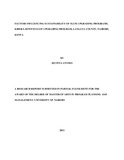| dc.contributor.author | Anyiso, Jecinta | |
| dc.date.accessioned | 2013-08-12T11:39:10Z | |
| dc.date.issued | 2013 | |
| dc.identifier.citation | Anyiso,J.,2013.Factors Influencing Sustainability Of Slum Upgrading Programs, Kibera-soweto East Upgrading Program, Langata County, Nairobi, Kenya. | en |
| dc.identifier.uri | http://erepository.uonbi.ac.ke:8080/xmlui/handle/123456789/55834 | |
| dc.description.abstract | Urbanization has played a major role in the development of informal settlements. Kibera slum is as a result of low incomes and inadequate housing provision system for the urban poor. Housing shelters in Kibera are of low quality characterized by open sewers, contaminated water pipes and there is no formal waste management system. The Kenyan government is concerned in upgrading slum settlements to improve the supply and quality of affordable housing for low-income earners, thus the establishment of Kenya Slum Upgrading Programme in 2000 involved in the upgrading process. The study examined factors influencing sustainability of slum upgrading programs in Kibera-Soweto East upgrading program. The study assessed how policy, community involvement, role of stakeholders and importance of records management influenced sustainability of upgrading program in Kibera-Soweto East upgrading program. Literature reviewed shows that urbanization has played a major role in the development of informal settlements in developing countries after the colonial period. The emergence of slums is as a result of poor housing policies and failure of the land markets that can be addressed by the land policy. National housing policies have shown little sign of deviating from the set objectives of conferring ownership rights thus the low income earners are denied access to affordable and decent rental market. Lack of secure land tenor ship is a major contributor to the establishment of informal settlements. The World Bank’s experience shows that success of upgrading programs is contingent upon community involvement in the project cycle. Participatory approaches involving all key stakeholders is key to setting practical solutions and to ensure proper succession planning and information proper record management systems should be put in place. The study used descriptive survey design to collect data. Systematic sampling and purposive sampling techniques was used to select respondents. Three groups were sampled for data collection two KENSUP program officers at the programmes offices in Nairobi, two staff members in the Ministry of Housing and occupants of the Kibera Soweto-East upgraded units. Research instruments used were; interview schedules and questionnaires. Data was analysed using descriptive statistics to generate frequency tables, mean and percentages. The findings were used to draw conclusions, suggestions and recommendations. Findings from the study revealed that housing policies formulated to address provision of low-cost housing to the urban poor have not been effective and majority of the residents noted that the issue of secure land tenure had not been addressed. The study further revealed that some of the upgraded units have been occupied by non-community members. Overall community involvement throughout the program cycle was minimal with a score of 61% and the record management system in place was not efficient. There was awareness of donor commitment and support in terms of funding but the level of support received from the government was poor. The study recommended that the government should regularize and have reforms in the land ownership structure and have demand driven housing policies to promote provision of low cost housing to the urban poor. The community should be actively involved in all program phases to enhance cooperation, ownership and sustainability. The government needs to have a budget allocation for slum upgrading programs and proper mechanisms and regulations that promote social housing. Efficient and effective information and record systems to support upgrading programs that can be used by individuals or counties seeking to promote equal housing for all its citizens or residents need to be put in place. | en |
| dc.language.iso | en | en |
| dc.publisher | University of Nairobi | en |
| dc.title | Factors influencing sustainability of slum upgrading programs, kibera-soweto east upgrading program, Langata County, Nairobi, Kenya | en |
| dc.type | Thesis | en |
| local.publisher | College of Education and External Studies | en |

